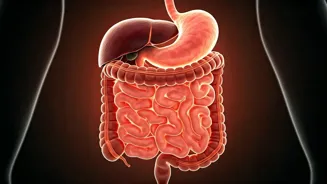Air Pressure Dynamics
The changes in air pressure during a flight are a major contributor to jet belly. As the plane ascends, the air pressure in the cabin drops, which causes
gases in the body, including those in the digestive tract, to expand. This expansion can lead to bloating, gas, and discomfort. Furthermore, the reduced pressure can make it harder for the body to process and eliminate gas, exacerbating the problem. The lower cabin humidity, often around 10-20%, further contributes to dehydration, which also affects digestion and can intensify bloating. This means that the very environment of air travel sets the stage for digestive issues for many passengers, emphasizing the need to proactively address these conditions to avoid unnecessary discomfort and enhance overall well-being during flights.
Dehydration's Digestive Role
Dehydration, another key factor in jet belly, stems from the dry air found within aircraft cabins. This arid environment pulls moisture from the body, affecting the digestive system. When the body is dehydrated, the digestive processes slow down. This slowdown means that food moves through the intestines more slowly, potentially leading to constipation and bloating. Furthermore, a lack of sufficient fluids can disrupt the balance of electrolytes, which are essential for proper muscle function, including the muscles that facilitate digestion. To counter dehydration, it’s crucial to increase water intake before, during, and after flights. Avoiding dehydrating beverages, such as alcohol and caffeinated drinks, can also help. By remaining hydrated, passengers can support their digestive health and greatly reduce the likelihood of suffering from jet belly.
Foods to Avoid
Choosing the right foods before and during a flight can significantly reduce the chances of experiencing jet belly. Certain foods are notorious for causing gas and bloating, intensifying the symptoms in the pressurized cabin. Carbonated beverages, such as sodas and sparkling water, release gas, leading to expansion within the digestive system. Foods high in sodium, like processed snacks and fast food, cause the body to retain water, which can worsen bloating. Fatty and fried foods are also challenging for the body to digest and can increase the risk of digestive discomfort. Finally, beans, cruciferous vegetables (like broccoli and cabbage), and artificial sweeteners are known to increase gas production. Making smart dietary choices and steering clear of these triggers can help passengers avoid feeling bloated and uncomfortable during their travels.
Proactive Preflight Measures
Taking proactive steps before a flight can greatly improve the experience of air travel. Starting a flight well-hydrated is critical. Begin hydrating a day or two before your trip and continue drinking water throughout the flight. Consider taking a walk before boarding to get your body moving and boost circulation, as this can stimulate the digestive system. Consuming a light, easily digestible meal a few hours before your flight can also help. Avoid overeating to prevent putting extra strain on your digestive system. Additionally, packing healthy snacks like fruits and vegetables, which are rich in fiber and water, allows for better control of what you eat during your travel. Planning ahead with these preflight measures can help passengers avoid many of the issues of jet belly and arrive feeling refreshed.
Comfort During Flight
During the flight, there are several strategies that can alleviate discomfort and decrease the impact of jet belly. Continuing to drink water is extremely important to counteract dehydration and facilitate healthy digestion. Avoid leaning toward the dehydrating drinks of alcohol and caffeine during the flight, as these will worsen your experience. Gently moving around the cabin, if possible, or performing simple exercises such as stretching in your seat, can promote blood flow and boost digestion. The use of over-the-counter medications, such as simethicone, can also provide some relief by reducing gas. Lastly, wearing loose-fitting clothing can improve comfort throughout the flight. By implementing these strategies, air travelers can lessen discomfort, avoid jet belly, and focus more on enjoying their travels.
Post-Flight Recovery
After a flight, the focus should be on helping the body recover from the effects of air travel. Gradually rehydrating with water is essential to replenish lost fluids and restart digestive processes. Incorporating foods rich in probiotics, such as yogurt or fermented foods, can help restore the balance of gut bacteria that may have been disrupted during the flight. Gentle exercises or walks can stimulate digestion and promote overall well-being. It is important to give your body time to adjust before consuming heavy meals. Consider enjoying a light, nutritious meal. By following these steps, travelers can bounce back from jet belly more quickly and enjoy a pleasant transition after their travels.














![[WATCH] T20 World Cup 2026: Gautam Gambhir hosts dinner for Team India players ahead of Namibia clash](https://g-mob.glance-cdn.com/public/fc/image/7gXS1xdhs5Q0.webp)

